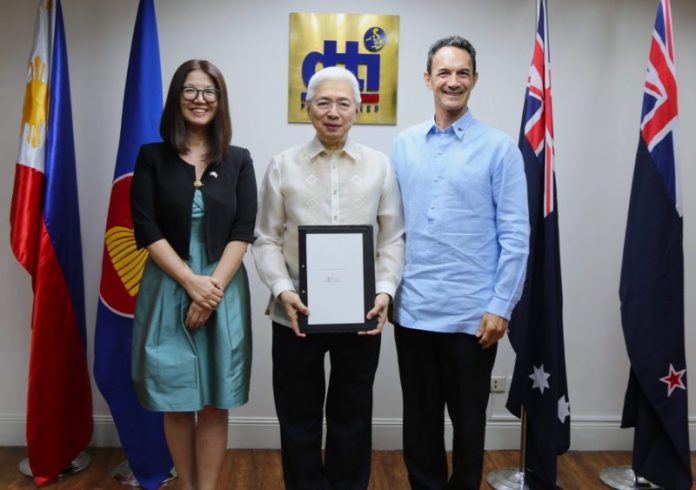
-
The Department of Trade and Industry signed two instruments that enhance free trade agreements with Australia, New Zealand and Hong Kong
-
Trade Secretary Alfredo Pascual signed the Second Protocol to Amend the Agreement Establishing the Association of Southeast Asian Nations-Australia-New Zealand FTA, and the First Protocol to Amend the ASEAN-Hong Kong FTA on February 14
-
The Second Protocol responds to the needs of businesses to make AANZFTA more efficient and trade facilitative in order to lower transaction cost
-
The First Protocol adopted more liberal rules of origin for manufacturing products such as food preparations, polystyrene, jewelry, woven fabrics, and denim
The Department of Trade and Industry (DTI) signed two economic instruments that enhance free trade agreements (FTAs) with Australia and New Zealand as well as Hong Kong.
Trade Secretary Alfredo Pascual signed the Second Protocol to Amend the Agreement Establishing the Association of Southeast Asian Nations (ASEAN)-Australia-New Zealand FTA (AANZFTA), and the First Protocol to Amend the ASEAN-Hong Kong FTA (AHKFTA) on February 14.
Under the Second Protocol, 13 Chapters in the original AANZFTA – including Rules of Origin, Customs Procedures and Trade Facilitation, Investment, Competition and Consumer Protection, and Electronic Commerce – were upgraded.
Three new chapters, namely Government Procurement; Micro, Small and Medium Enterprises (MSMEs); and Trade and Sustainable Development, as well as new provisions on education services under the Chapter on Trade in Services have also been added. This responds to the needs of businesses to make the AANZFTA more efficient and trade facilitative in order to lower transaction cost.
The First Protocol to Amend the AHKFTA, on the other hand, adopted more liberal rules of origin for manufacturing products such as food preparations, polystyrene, jewelry, woven fabrics, and denim. Simpler rules will allow traders to claim the lower tariffs in the agreement.
The deal updates the Product Specific Rules (PSR) of origin under the FTA, enhancing the coverage of the PSR from more than 200 categories of products to almost 600.
In a statement, Pascual said “The finalization of the Second Protocol to Amend the AANZFTA represents another milestone in our work to further strengthen regional trade and investment flows between ASEAN, Australia, and New Zealand. We want to ensure the agreement continues to benefit businesses and reinforce our strategic links in the region.”
The DTI said the new rules to boost merchandise trade under the Chapter on Trade in Goods and Customs Procedure include facilitating trade of essential goods during humanitarian crises and addressing related issues on non-tariff measures.
Market access commitments under the amended AANZFTA Chapter on Trade in Services are seen to provide greater stability for Filipino businesses interested in investing and providing services in Australia and New Zealand. These include sectors such as professional services, education, transportation, construction, tourism, and banking services, among others.
Other key provisions under the Second Protocol are the professional services and education services cooperation annexes, which provide a framework for relevant authorities to negotiate initiatives on the mutual recognition of professional qualifications, licensing, or registration in professional services sectors or bilateral or regional cooperation.
These provisions will allow recognition of educational qualifications, digital education, blended learning, and other diverse forms of education delivery. They will further assist Filipino professionals in practicing their profession in Australia and New Zealand.
The new commitment complements the country’s implementation of the Transnational Higher Education Act or Republic Act 11448, passed in 2019, allowing foreign universities to provide education services by partnering with a local institution.
There are also enhanced provisions to promote electronic payments in the region, competition rules to lower barriers, and consumer protection to ensure fair trade practices.
READ: EO inked on new tariff rates under ASEAN-HK trade deal




